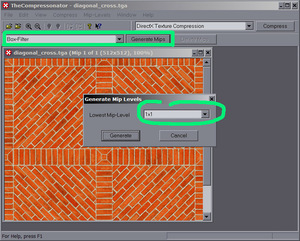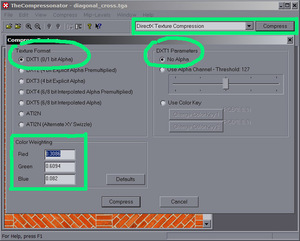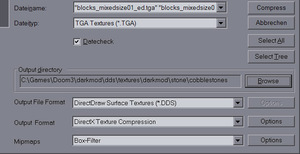DDS Creation with ATI Compressonator: Difference between revisions
mNo edit summary |
|||
| Line 9: | Line 9: | ||
* working with TGA and DDS, and where files should be placed in your FM | * working with TGA and DDS, and where files should be placed in your FM | ||
* guidance about DDS creation settings | * guidance about DDS creation settings | ||
== Compressing Diffuse and Specular Maps == | == Compressing Diffuse and Specular Maps == | ||
| Line 27: | Line 17: | ||
[Note - actually, better quality filters that Box are preferred.] | [Note - actually, better quality filters that Box are preferred.] | ||
* Click the Compress button next to "DirectX Texture Compression" | * Click the Compress button next to "DirectX Texture Compression" | ||
* Select the correct compression type, | * Select the correct compression type: | ||
*'''Diffusemap :''' Does the texture have '''transparency'''?(i.e leaves, spiderwebs etc) | |||
:*If '''NO: DXT1''' | |||
:*If '''YES: DXT5''' | |||
*'''Specularmap :''' | |||
:*'''DXT1''' - specular does not require alpha information. | |||
*'''Normalmap :''' | |||
:*'''NONE''' - Use TGA! | |||
* Make sure that the channel weighting values are as follows : | * Make sure that the channel weighting values are as follows : | ||
:'''red=0.3086''' | :'''red=0.3086''' | ||
Revision as of 21:18, 18 August 2020
Note - Prior to August, 2020, a longer version of content lived at DDS creation. Go there for a newly-written tool-independent overview of DDS creation. Further revision of the material below was done.
Introduction
You'll need ATI's "The Compressonator". Install/unzip it to a folder and create a shortcut if you like.
(At one time, the exact version 1.21.1044 given by the foregoing link was required, because it alone could compress DXT5 RXGB normalmaps. Compression of normalmaps should no longer be done.)
Please review DDS creation for general information about
- working with TGA and DDS, and where files should be placed in your FM
- guidance about DDS creation settings
Compressing Diffuse and Specular Maps
- Open your source (TGA) file
- Create Mip Maps using the Box-Filter with the lowest mip map size of 1x1.
[Note - actually, better quality filters that Box are preferred.]
- Click the Compress button next to "DirectX Texture Compression"
- Select the correct compression type:
- Diffusemap : Does the texture have transparency?(i.e leaves, spiderwebs etc)
- If NO: DXT1
- If YES: DXT5
- Specularmap :
- DXT1 - specular does not require alpha information.
- Normalmap :
- NONE - Use TGA!
- Make sure that the channel weighting values are as follows :
- red=0.3086
- green=0.6094
- blue=0.082
- Click Compress
- Save your DDS to the /dds/ tree
Change the File Extension to Lowercase
The Compressonator automatically names the file *.DDS, but all files should be lowercase (including TGAs). Be sure to rename the files to a lowercase .dds extension before game testing:
Option A: Use Windows Explorer. You need to change your Explorer settings to display the file extension:
- Open up Windows Explorer
- Go Tools > Folder Options
- Click the View tab and disable Hide extensions for known file types
Then you can highlight your file and hit F2 (or right-click > Rename) and change the extension to lowercase.
Option B: This can also be done via the command line Start > Run... > cmd (then cd to your textures folder) and rename the files via:
- ren *.DDS *.dds
About Transparency
At this time TDM only supports hard edges for transparency, so you won't get a gradual blending. However, saving the 8-bit alpha channel - and using DXT5 compression - "future-proofs" your material for a day when TDM could support this smooth blending. In the meantime, hard edge clipping occurs by default at 50%; use the the "alphaTest" keyword in your material to easily control this.
When converting from TGA with Alpha to DDS, the alpha doesn't always work correctly. Causes for this vary, but:
- One easy workaround is to save your texture out as a TIFF and then open that in The Compressonator.
- If you are saving from Photoshop/GIMP, disable Layers in the save options, but make sure it's set to preserve transparency.
- When opening it in The Compressinator, right click in the image and view RGBA/Alpha to check that it is correct, before generating mipmaps or compressing.
Batch Processing
Choose File > Batch Compress or hit F4 to open the batch compression dialog. Choose the same compression settings described above, while taking care to separate file groups that use different compression settings.
Command Line Parameters
ATI's compressonator provides some command line parameters to compress the textures:
thecompressonator -convert "specular.tga" "specular.dds" DXT1 -mipmaps thecompressonator -convert "diffuse.tga" "diffuse.dds" DXT1 -mipmaps thecompressonator -convert "diffuse_with_alpha.tga" "diffuse.dds" DXT5 -mipmaps
Converting From DDS to Common Image File Formats
This is trivial but slightly confusing on The Compressonator:
- File Menu > Save Original
- At the bottom of the dialog, below the file name input, select save as type. It may show DDS by default; don't be put off.
- Select file format from BMP, PNG, or TGA (use TGA generally for Dark Mod.)
- Make sure the filename you want is shown in the input box and click save.
See also
- DDS creation for general, tool-independent information about DDS creation. Also, the original wiki page history of content now on this page may be found there.


